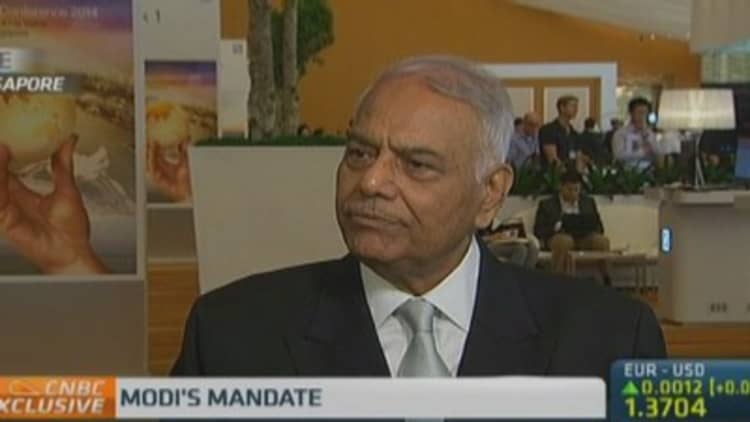As Malaysia-based low-cost carrier AirAsia gets set for takeoff in India, CEO Tony Fernandes says there couldn't have been a better time to launch a new business in the country.
"There's a wave of optimism tied to the new government. If there's ever great timing to start a new business in India I think we picked it," Fernandes told CNBC on the sidelines of the World Economic Forum in Manila. "People are confident and feel this is a new beginning – that's 50 percent of the battle."
"A government that wants to listen and hear the views to make business easier, is always a good thing," Fernandes added. AirAsia has tied up with India's Tata Group to launch AirAsia India – the first India-based airline with foreign investment– in the next few months.
The Narendra Modi-led Bharatiya Janata Party (BJP) government's thumping election victory has driven a palpable turnaround in economic sentiment among business leaders both in and outside India.
Read MoreUnder Modi, can India's economy take on China?
The BJP is seen as pro-business and reform-minded – a welcome change from the ousted Congress-led government that presided over the worst economic slowdown since the 1980s. Asia's third-largest economy grew 4.7 percent in the final quarter of 2013, down from its near-9 percent expansion in fiscal year 2011.
Jaspal Bindra, chief executive, Asia of Standard Chartered, a U.K. bank that has a strong presence in India, says the new leadership is "fantastic" for the bank's operations.
"It's going to be hugely positive from a business and economic point of view. Compared with where India has been in terms of reforms in the last few years, this is going to be a leap frog up," he said.
Translating optimism to investment
After years of sluggish investment – a key factor behind the continued growth slowdown – increased optimism is precisely what India's economy needs.
Read MoreThe top 4 priorities for India's new government
Corporate executives say it won't be long before private-sector investment ramps up.

"We should begin to see changes about 6 months from now. We're already beginning to see the influx of money from overseas and that's a big positive – but the real traction will happen when projects which have been stuck on the ground for too long really get unblocked," said Daljit Singh, President of Fortis Healthcare – one of India's largest hospital chains.
If Modi is able to push through initiatives like a "single-window" for faster project approvals during his first few months in office it would provide a clear signal to the corporate sector that he means business, Singh noted. Delays in environmental and regulatory clearances have slowed down investments.
The BJP's opposition towards opening up the multi-brand retail sector to overseas players has given rise to concerns that the party may not be as business-friendly as hoped.
Read MoreIndia's Modi has a clear mandate but can he deliver?
However, Singh says this should not be extrapolated as the BJP's overall stance towards economic liberalization.
"There are going to be think-tanks which are going to look at the merits of investment in sub sectors. They may take a tougher view on certain sectors compared to others – that's perfectly acceptable," he said.
Bindra agreed, adding, "They have said this is a government for the poor, women, and youth and so they are going to have to prioritize business growth with that. If they feel things like FDI (foreign direct investment) in multi-brand retail impact the lower class retail community then obviously it will be lower down in their priorities."
"The BJP are going to prioritize where they reform. I think infrastructure and tax reform will be very high up. These are in the scheme of things much bigger," he added.


